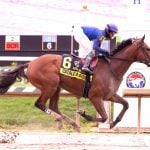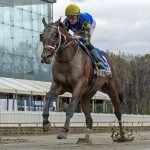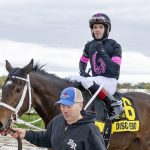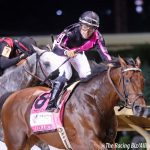40 years after Deputed Testamony: why no Maryland-bred Preakness winner since?
When an unheralded horse with a teenaged, second-choice jockey slipped through along the rail and splashed home best in the 1983 Preakness, it was less an outlier than a continuation.
Deputed Testamony was the eighth Maryland-bred to win the Preakness and the third in less than 20 years, following in the hoofprints of Bee Bee Bee (1972) and Kauai King (1966).
What no one knew – or could have known – at the time was that, 40 years on, the modestly bred son of Traffic Cop would remain the most recent Maryland-bred to wear the black-eyed susans.
Since, there have been a couple of near-misses, a handful of horses that generated interest at the wagering windows, and a few genuinely outstanding Maryland-breds who, for one reason or another didn’t run in the Preakness.
So: good, even great Maryland-breds. But no Preakness winners.
Why not?
It’s an interesting question, one that elicits a variety of answers.
Let’s start with perhaps the most obvious of them: luck. There’s only one Preakness winner a year; a lot of factors have to line up correctly.
Bill Boniface, patriarch of Bonita Farm an breeder, trainer, and co-owner of Deputed Testamony, a son of Traffic Cop out of the Prove It mare Proof Requested, describes the breeding of his biggest star thusly:
“I had Traffic Cop, and he was kind of a reject from Spendthrift Farm,” he remembered. “Mr. Sears was calling with this mare. I said, ‘You got the mare for $500. I got this horse standing for $500. Why don’t you put up the mare, and I’ll put up the stud, and we’ll be 50-50 on the foal?’ We shook hands, and there was never anything on paper.”
Which makes for a great story, but isn’t exactly a replicable business model. Yet it’s funny how often that turns out to be the model for top horses.
CHECK OUT THE LATEST OFF TO THE RACES RADIO!
Take the case of Maryland-bred Hall of Famer Safely Kept. She was the 1989 Eclipse Champion Sprinter, in 1990 won the Breeders’ Cup Sprint, and in 2011 entered racing’s national Hall of Fame. But her beginnings were less auspicious.
“I sent a mare down to [the stallion] Horatius. I can’t even tell you what the mare’s name was,” said David Hayden, who with wife JoAnn bred Safely Kept. “And Charlie McGinnes said, you know, she wants to fire out, and Horatius said, ‘I’m not doing this because she’s too mean.’ So I just looked at my chart and said, ‘Who’s the next mare who can be bred,’ and it happened to be Safely Home.”
The resultant foal took the racing world by storm.
And that’s to say nothing of racing luck, Actually, let’s say something of racing luck.
A dozen years after Deputed Testamony got the winning Preakness trip, Boniface returned with Oliver’s Twist, a son of Horatius who entered the Preakness of a win in the Federico Tesio Stakes, then run at Pimlico, but went off at 25-1 in the Middle Jewel.
“He was a step up,” Boniface joked. “Deputed was by a $500 stud, and he was by a $1000 stud.”
Despite modest beginnings, he finished second, beaten a half-length after a troubled trip..
“I blame that one on myself,” Boniface admitted. “The night before the race, I took [jockey Alberto] Delgado up on the hill by the track and I said, ‘Now, listen: this horse is gonna run the best race of his life. But you’ve got to ride the best race of your life. Save every inch of ground and move at the right time.’”
Delgado followed the first part of the instructions perfectly, saving every inch of ground. But he couldn’t find a seam through which to run until it was too late.
“He was trapped inside, and he stayed inside,” Boniface remembered. “Then there was no opening to get out.”
Or take the case of Knicks Go. He won a Grade 1 race as a two-year-old and was second in the Breeders’ Cup Juvenile – seemingly putting him on the Triple Crown trail. But he had a dismal, winless three-year-old seasons before returning at four and five to win eight of 10 starts and Horse of the Year honors.
“It’s a lot of luck,” Sabrina Moore, who with her mother Angie bred Knicks Go. “I think doing your homework definitely counts, but it’s a lot of luck.”
A second reason for the 40-year drought is numbers.
“I’ve been around a long time,” said Hayden. “When Maryland Million started, there were 135 stallions in Maryland – 135! Now there’s only 22, 23. You had Polish Numbers and Two Punch and Not for Love, you know, go back to the Northern Dancer era.”
It’s not just a dearth of stallions. There are fewer mares in Maryland and thus fewer foals bred, said Maryland Horse breeders Association executive director Cricket Goodall.
“That was 1985,” she said. “That was when there almost 40,000 foals nationally; that was when the industry was thriving.”
As a result, Maryland’s foal crop was much larger, routinely topping 1,000. It’s been 20 years since that threshold was reached, according to Jockey Club numbers; last year it was 691.
While Maryland’s breeding industry has held its own in terms of its percentage of the national foal crop, that combination of fewer quality stallions breeding fewer mares means fewer chances to find the one big horse needed to win the Preakness.
Consider the 1982 running of the Maryland Juvenile Championship. Dixieland Band won that race and went on to win two graded stakes. Deputed Testamony finished second, and Caveat, winner of the following year’s Belmont Stakes was third.
A lot of Maryland-breds not only are born here but also live out their racing careers at the Maryland tracks. Along with luck and numbers, Boniface thinks this fact points to a third factor.
“A lot of Maryland guys are scared,” he said. “They see all those big names coming in, and they’ve got a horse with a shot, but they’re scared to go up against them. That was not the case back then.”
There may be something to that. In recent years local horses typically have not contested the Preakness unless, like Alwaysmining in 2019, Malibu Moonshine in 2005, and Water Cannon in 2004, they had swept through the local prep stakes.
Oddly enough, though, the most recent Maryland-bred to finish in the exacta, Nancy Alberts’ Magic Weisner, lost in the Tesio before finishing a fast-closing second behind War Emblem at odds of 45-1 in the 2002 Middle Jewel.
Perhaps that makes the John Salzman-trained Coffeewithchris a more intriguing play at expected long odds. If nothing else, he fits the Boniface bill of taking a shot. He finished fifth, but beaten less than three lengths in the Tesio.
“I buy horses cheap, I race them early, I don’t usually buy horses to run classic distances. I win a lot of races with sprinters.” Salzman said.
But each time he stretched Coffeewithchris out – from six furlongs to seven, seven to a mile, and then beyond – the horse answered the bell.
“I never thought I’d be in this position, but I’m glad to be here. We’re 20-1 (on the morning line),” the trainer, also a co-owner, said. “it’s an eight-horse field, so we’re gonna take a chance at it. I’m hoping for the best.”
Maryland, and history, wait.
LATEST NEWS














